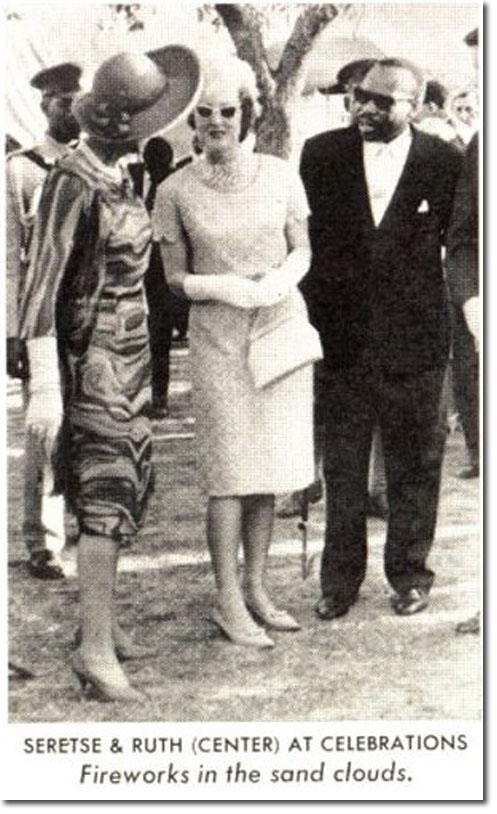|
|

 |
|
From Time Magazine October 7th, 1966:
Birthday gifts came streaming into the dusty, desertside capital of Gaberones. From Britain, $40 million for famine relief and economic development. From the United Nations, $15 million for livestock feeding, community development and an anti-tsetse-fly campaign. From the U.S., a $70,000 twin-engined Beechcraft Baron light executive plane. And from the vast Kalahari Desert just outside of town, a blinding sandstorm that nearly ripped Botswana's new black-white-and-blue flag from the pole before it could be tied down. As fireworks illuminated the swirling sand clouds overhead, a tribal witch doctor swept back his cockerel headdress, tucked his baboonskin shirt between his knees, and flashed a mossy grin. "There will be rain," he predicted. "Everyone will be fat." Buffalo & Beef It was the sort of hopeful sentiment that independence inevitably evokes in black Africa. As Botswana's birthday gifts indicated, Africa's 33rd new nation of the decade faces a combination of problems that bode ill for future success. The former British colony of Bechuanaland is a Texas-size sprawl of sand, rock and scrub-thorn; elephants, buffalo and springbok outnumber the scrawny Tswana cattle on which its 576,000 people depend for a living; in the fifth year of drought, both cattle and men are facing starvation. As if that were not enough, black Botswana (only 4,000 of its inhabitants are white) is locked like a parched pistachio in the nutcracker of white South Africa and Rhodesia. Botswana's strongest asset is its first president, Sir Seretse Khama, 45, a burly, blueblooded Oxonian who has become one of Africa's staunchest advo cates of racial harmony. Eighteen years ago in London, Seretse cast away his paramount chieftainship of the powerful Bamangwato tribe to marry a blonde English clerk named Ruth Williams. The marriage embarrassed both Seretse's despotic uncle, Tribal Regent Tshekedi Khama, and the Labor government of Clement Attlee, which hustled Seretse into an exile that lasted eight years. Victory & Vorster. Since their return to Africa, Seretse and Ruth have proved to be more than mere celebrities: Sere tse's moderate, anti-Communist Dorn-krag party won last year's elections handily over the rabid black-nationalist party of Phillip Matante; Ruth's relief work in the kraals and mud huts of the natives has won her the affectionate title of Mwa Rona (Our Mother). Though he is a persistent and vocal critic of South Africa's apartheid policy, Seretse finds it appropriate to cooperate with the government in Pretoria. For example, he plans to prosecute seven Tanzanian-trained black guerrillas captured last week as they crossed into his country en route to South West Africa, the U.N. mandate that remains in South Africa's control. The guerrillas, armed with Russian and Chinese submachine guns, carried with them the hopes of all blacks dedicated to the overthrow of South Africa's regime, and their trial in Francistown will not endear Seretse to his African brothers to the north. But his nation is economically dependent on the continued good will of Prime Minister Balthazar Vorster's regime. Botswana sells its goats, cattle and hides to South Africa, and 40,000 men find work in the gold mines and factories of Johannesburg--jobs that bring in an estimated $1.5 million a year. Vorster, in turn, is reluctant to encourage Botswana's enmity. After all, it could serve as a bridge to trade with the black nations to the north or, conversely, as a guerrilla haven within striking range of Johannesburg. |
Armed Forces | Art and Culture | Articles | Biographies | Colonies | Discussion | Glossary | Home | Library | Links | Map Room | Sources and Media | Science and Technology | Search | Student Zone | Timelines | TV & Film | Wargames